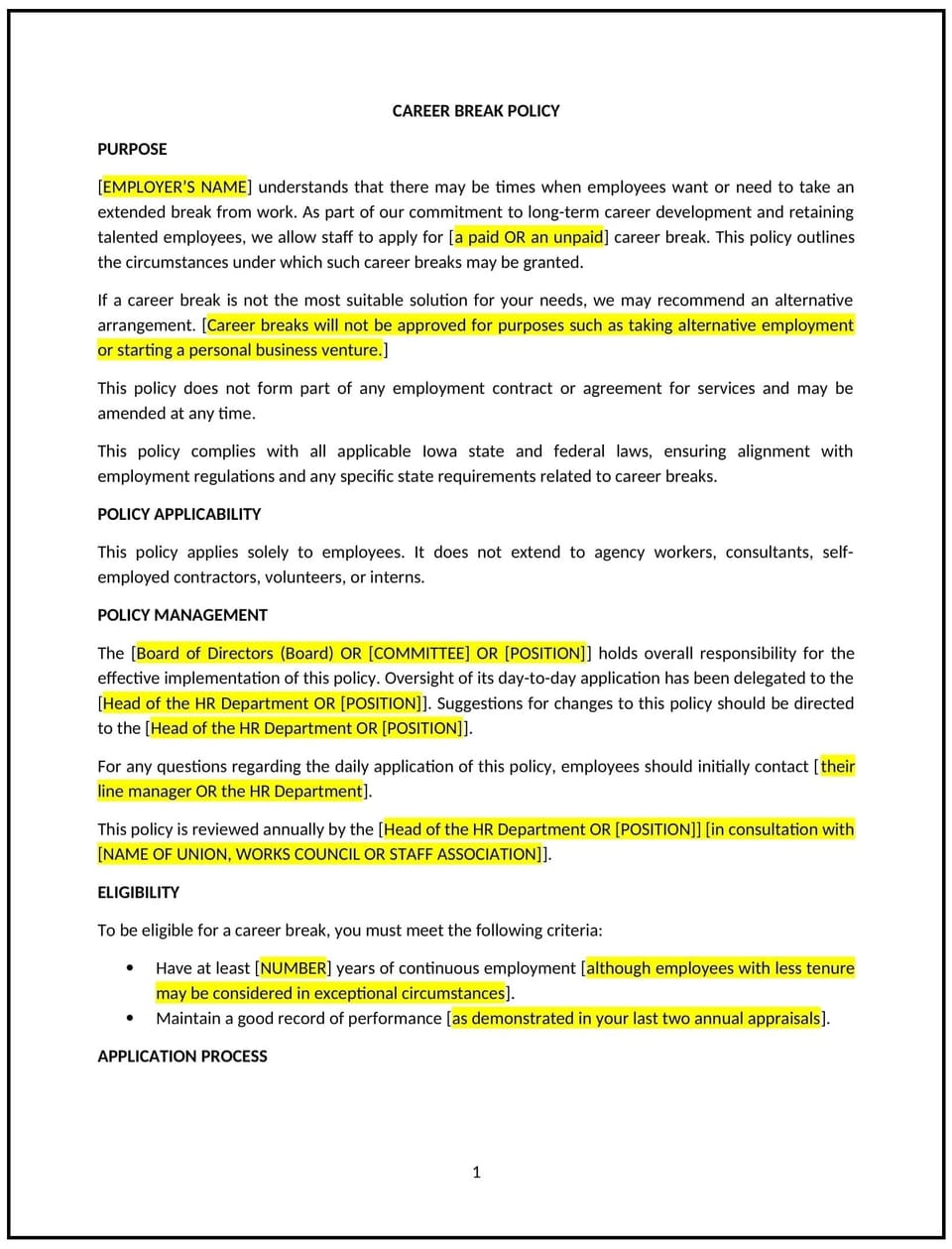Career break policy (Iowa): Free template

Career break policy (Iowa)
A career break policy helps Iowa businesses provide employees with the option to take an extended period of unpaid leave for personal or professional development. Career breaks may be used for further education, travel, caregiving, or personal well-being while maintaining the possibility of returning to work after an agreed-upon period.
This policy outlines eligibility criteria, the application process, and expectations for returning employees. It helps businesses balance operational needs while offering flexibility to employees seeking a temporary leave from their careers.
By implementing this policy, businesses in Iowa can support employee well-being, improve retention, and attract talent by offering greater work-life balance options.
How to use this career break policy (Iowa)
- Define eligibility requirements: Specify which employees qualify for a career break, such as full-time employees with a minimum tenure.
- Establish duration limits: Outline the maximum length of a career break and any minimum requirements.
- Set the application process: Require employees to submit a formal request, including reasons for the break and expected return date.
- Address job security considerations: Clarify whether employees will have a guaranteed role upon return or if they may need to apply for a suitable vacancy.
- Outline benefits impact: Explain how career breaks affect health insurance, retirement plans, and other employee benefits.
- Provide re-entry procedures: Establish steps for reintegrating employees, including any necessary training or role adjustments.
- Manage operational continuity: Ensure departments can redistribute work responsibilities during the employee’s absence.
- Review and update: Regularly assess the policy to reflect business needs and workforce expectations.
Benefits of using this career break policy (Iowa)
This policy offers several advantages for Iowa businesses:
- Enhances employee retention: Encourages long-term commitment by offering flexible leave options.
- Supports work-life balance: Allows employees to manage personal responsibilities without permanently leaving the workforce.
- Improves talent attraction: Makes businesses more appealing to professionals seeking career flexibility.
- Reduces turnover costs: Helps businesses retain skilled employees who might otherwise resign.
- Encourages professional development: Enables employees to pursue further education or skill-building opportunities.
- Strengthens workforce planning: Provides a structured approach to managing temporary absences.
Tips for using this career break policy (Iowa)
- Communicate policy details: Businesses should ensure employees understand career break eligibility, application steps, and re-entry expectations.
- Set clear approval criteria: Businesses should outline how requests will be assessed to maintain fairness and consistency.
- Consider business needs: Businesses should evaluate operational impact before approving career breaks.
- Address benefit implications: Businesses should inform employees of any effects on health insurance, retirement plans, or seniority.
- Provide return-to-work support: Businesses should offer reintegration assistance, such as refresher training or flexible work options.
- Review policy periodically: Businesses should update the policy as workforce expectations and operational requirements change.
Q: Why should Iowa businesses offer a career break policy?
A: Businesses should provide career breaks to improve employee retention, support work-life balance, and offer flexibility without permanent workforce loss.
Q: How long should career breaks typically last?
A: Businesses should set a maximum career break duration, often ranging from six months to two years, based on operational feasibility.
Q: Can businesses guarantee employees a job after a career break?
A: Businesses should clarify whether employees will return to the same position or if they will need to apply for an available role.
Q: How should businesses handle work redistribution during a career break?
A: Businesses should plan ahead by assigning temporary responsibilities to other team members or hiring contract workers if necessary.
Q: What benefits continue during a career break?
A: Businesses should specify whether employees can maintain health insurance or retirement contributions during their leave period.
Q: How should businesses reintegrate employees after a career break?
A: Businesses should offer onboarding support, refresher training, or mentorship to help returning employees transition back to work.
Q: Can employees request an extension for their career break?
A: Businesses should establish a process for extension requests, including deadlines for submission and evaluation criteria.
Q: How often should businesses review their career break policy?
A: Businesses should reassess the policy annually to align with workforce trends and operational needs.
This article contains general legal information and does not contain legal advice. Cobrief is not a law firm or a substitute for an attorney or law firm. The law is complex and changes often. For legal advice, please ask a lawyer.


